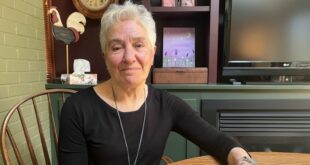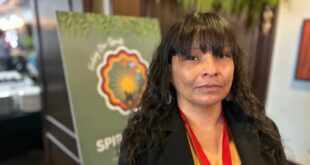The Farmworker Hub says it has seen a 27 per cent increase in demand this year

An increasing number of migrant farm workers in Ontario's Niagara region, whose work helps bring local produce to market, are facing food insecurity, according a local organization that supports them.
The Farmworker Hub says it has seen a 27 per cent increase in demand in food and clothing supplies this year.
"This season already, we've had close to 2,300 visits since the middle of March," said the Hub's founder, Julia Buxton-Cox.
The organization has not had a need of donations of this size since it started in 2021, said Buxton-Cox.
"We've just seen such an increase in the need and one of the things I've never been able to successfully address is food insecurity," she said.
"It's so ironic that the people who feed us are hungry."
The volunteer-based initiative collects and gives away donations of food, clothes and other necessities to migrant farm workers in the area.
Buxton-Cox the rising cost of living is likely a reason for the increased demand.
"Everything is just going up, up, up, up, up, and yet these men and women are still making minimum wage," she said.
"Minimum wage is not a living wage. I'm not suggesting that any of our employers are wrong for paying minimum wage, I'm just saying that it doesn't correlate the inflation and the rising cost of everything."
Donations of household items, clothing also needed
Buxton-Cox said shelves at the hub are "pretty bare" and the group says it is in dire need of donations to help support workers.
One of the Hub's biggest needs right now she said is men's jeans sizes 32 to 36, long-sleeve shirts, hoodies and winter coats.
"It's hot today, but we're going to be needing winter coats for those who are here until December," said Buxton-Cox.
Other items the group is looking for are pots and pans, toiletries and other items of clothing.
"If it's cold in the morning, or if they're trying to block the sun, or for the the women who are working in the packing plant [where] it's quite cold. So to be able to have a hoodie is not only comforting, but it provides the warmth," she said.
'That's my neighbour'
The Farmworker Hub started as a Facebook group where people were encouraged to donate items, according to Buxton-Cox.
"I would say on social media 'we need men's winter coats,' and then all of a sudden, 20 winter coats would show up that week," she said.
The group has grown exponentially since then and now has over 40 volunteers, including Brittney Sliasas, who is the volunteer co-ordinator.
"Without [the volunteers'] time and support, we wouldn't be able to function," she told CBC Hamilton. "We are very grateful and proud to have such a supportive volunteer group."
The Hub also hosts a get-together every Sunday where migrant farm workers socialize, play pool and take advantage of the resources available to them.
She said places like the Hub are especially vital for communities like Niagara-On-The-Lake, where stores and services are hard for workers to get to.
"Niagara-On-The-Lake is beautiful, but it's also far from … anywhere that you need to go, really," she said.
"It's been beneficial because these guys might not have access to certain things when they need them."
Sliasas started volunteering at the Hub after seeing Buxton-Cox's work, shortly after moving to town from nearby St. Catharines in 2021.
Buxton-Cox said services like the Hub are important to engage workers — who, according to her, make up around 10 per cent of Niagara-On-The-Lake's population — into the community.
"Now people are recognizing like, 'hey, that's my neighbour,' or 'I see that same guy at the grocery store every Thursday night,'" she said. "And you know, it's all part of one community helping each other."
ABOUT THE AUTHOR
Freelance reporter, CBC Hamilton
Aura Carreño Rosas is a Hamilton-based freelance journalist from Venezuela, with a passion for pop culture and unique people with diverse journeys.
*****
Credit belongs to : www.cbc.ca
 MaharlikaNews | Canada Leading Online Filipino Newspaper Portal The No. 1 most engaged information website for Filipino – Canadian in Canada. MaharlikaNews.com received almost a quarter a million visitors in 2020.
MaharlikaNews | Canada Leading Online Filipino Newspaper Portal The No. 1 most engaged information website for Filipino – Canadian in Canada. MaharlikaNews.com received almost a quarter a million visitors in 2020.







